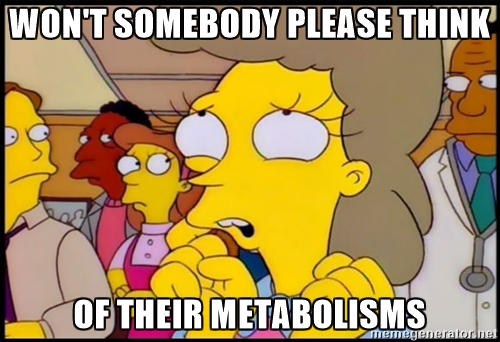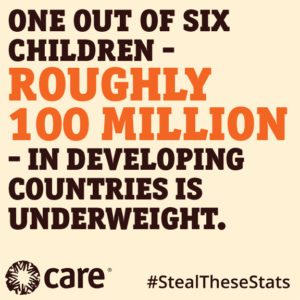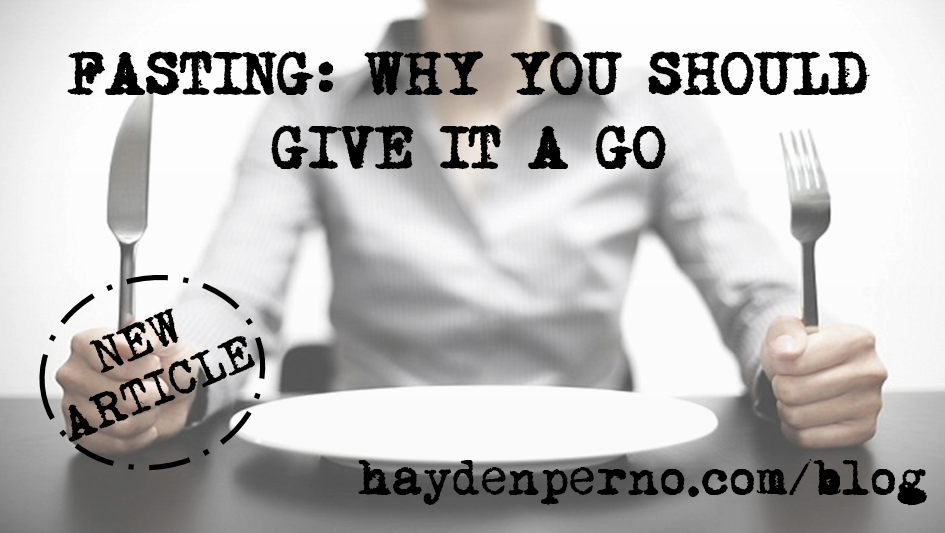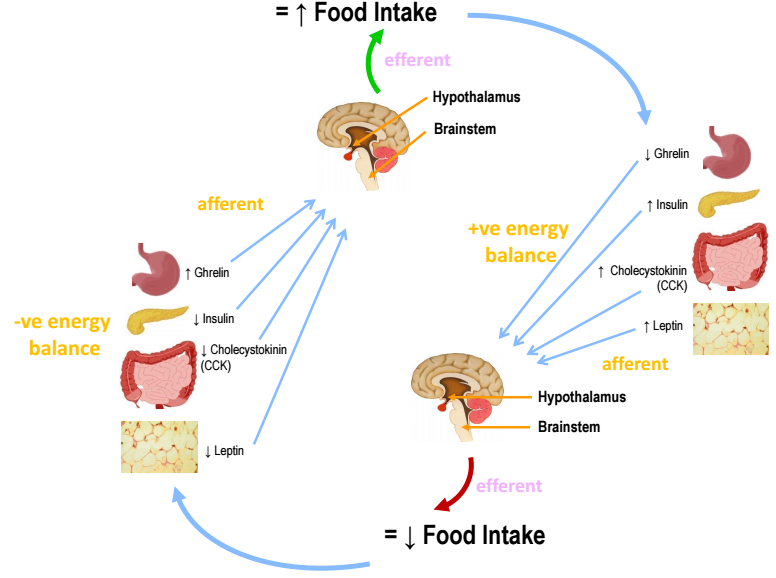NOTE: This article is not meant to provide anyone with medical advice. This is purely a sample idea for people. I highly recommend consulting your general practitioner before trying anything like I mention during this article.
Last week, I tasked two of my clients with a homework project consisting of not eating for an entire 24-hours.
“Ludicrous!! Has he gone mad!?”

You’re right to think that a complete restriction from the intake of any calories whatsoever definitely sounds a little bonkers. But before you dial the metabolism bureau hotline, let me explain.
THE WHY
There is no doubt that a short-term calorie restriction (i.e. 12-72 hours) with no food, no tasty beverages, and even no barley sugars that we get in school while raising money for certain charities, can certainly make someone go crazy.
We are, after all, surrounded by food. It’s on every corner, every ad break, on everyone’s mind.
But while you may typically relate the term ‘malnourished’ to a lack of food, it also covers the direct opposite: the overindulgence and over-consumption of foods that we don’t need, yet we can’t seem to stop eating.
Hunger can be a habit. So can eating. Our emotions, survival needs, and routine, all combine to provide us with something that plays on our minds.
Quite literally, too.

Inside our brains, there is a chemical named dopamine that acts upon D2 receptors following a meal. This interaction provides us with that happy and rewarding feeling, increasing our desire to eat.
There are other hormones up there that play a role in food intake, too, like ghrelin, leptin, neuropeptide-Y, proopiomelanocortin, and norepinephrine, just to name a few. And these guys like to play with our psyche and result in an eating pattern that our ancestors would envy and roughly 800 million humans would be gobsmacked at.

We surely are overindulging, over-consuming, wasting, and with a world plagued by supplement companies trying to make a quick mil‘ and food companies funding studies just so that their product looks good and sells, it’s hard to know which way to look when it comes to what information to listen to.
Because of this, myths are formulated and information is construed. Which is one reason I’m writing this and in fact, the very reason I proposed the challenge to my clients in the first place.
With a goal of opening their eyes to everything they have ever thought or learnt about eating, weight loss, and overall health, it was important for me to firstly brief them about a few of the most common misconceptions that arise when discussing this type of topic.
Here they are as follows.
THE FIRST MYTH: METABOLISM
Regardless of the fact that half the internet, even I, have debunked the fallacies surrounding this odd necessity for a high frequency consumption of meals to “boost” metabolism, the plague lives on.
To tackle it once again, however, let’s cut to the chase really quick.
This particular myth comes about from what is known as the thermic effect of food (TEF). This has to do with calories that are burnt during consumption and digestion. And on average, over the different macronutrients, works out to be roughly 10% of overall calories per meal.
So, if we take 10% from a 500 calorie meal, we obviously get 50 calories being burnt. And if we ate three of those 500 calorie meals, we’d be looking at roughly 150 calories being used up thanks to TEF.
But if we now take 10% from two 500 calorie meals, and ate six of them throughout the day, we would still be left with 150 total calories being used up by TEF at the end of the day.
Simple math leading to TEF and the metabolism myth being handled. Let’s tackle another one.
THE SECOND MYTH: HUNGER & HORMONE REALITY
When discussing food intake, ghrelin and leptin spring to mind. Going deeper, neuropeptide-Y (NPY) and proopiomelanocortin (POMC) also show up.
But these names are ridiculous, so let’s make things a little easier and pair them up, putting ghrelin with NPY and labelling them ‘hunger hormones’ (HH’s), and leptin with POMC and labelling them ‘satiety hormones’ (SH’s).
HH’s, you see, act as stimulants. They send signals to your brain when you’re hungry, and tend to sync up with your eating, movement and lifestyle habits. They can be rather easy to manipulate, however, and if you so happen to prefer eating at 3pm each day, and do so regularly, then these hormones (ghrelin, in particular), get used to that, and will signal at that time each day.
SH’s, on the other hand, send fullness signals. If we eat enough, and our other hormones are acting professionally – along with other factors like your mechanoreceptors upon your stomach (the ones that stretch and tell your brain when you’ve eaten enough) – they tell our brains to cease food consumption. Being overweight can affect this normal functioning, but click here to read more about that.
Hormone imbalance from the lack of food consumption during a short-term restriction, is far off the tables, however. And one of the best ways to explain it is in evolutionary terms where a lack of food can administer an adrenaline response, where an increase in mental alertness, cognitive functioning and increased energy can help you hunt down that mammoth.
THE THIRD MYTH: CATABOLISM
This myth is an all-time classic. Catabolism, or muscle loss, is only a worry if and when you start to surpass long timeframes consisting of 72 hours or more. Even longer, in fact, if you carry a lot of excess fat.
A simple 10-24 hour fast, however, is certainly not going to be detrimental to an individual (minus medical conditions). And if you really think about it, when you have that little sleep-in on a Sunday with a nice 10-12 hour stint, does that cause you to waste away to a big pile of atrophied tissue?
Most likely not. I talk more in-depth about this particular topic in this article and this one, too.
So it’s not metabolism, catabolism or hormone tampering, then what types of things can be challenged?
THE MIND
This if by far the true star of this type of homework assignment.
Our culture is rich with lunch and dinner catch ups, dates and meetings scheduled in and around food, there truly is no escaping this lifestyle that we are all so lucky to lead in a country like this.
Challenging the mind control and willpower of an individual during a 24-hour fast, is a great test of their psyche and willpower. And speaking of this, my clients, which I’m happy to say, both came out of it alive and in good spirits.
Admittedly there were a couple of freak-out texts here and there during the day, a few bird filtered Snapchats too, but overall, the outcome was what I wanted…
FREEDOM

The freedom that can be gained from a simple challenge like this is the most rewarding. The realisation that there is now less to worry about on a journey that is already surrounded by conflicting information and options, is a huge positive in my eyes.
Understanding that there is no dire need to carry around a hundred Tupperware containers, or stress about missing breakfast before you leave for work, and that your eating style can complement your lifestyle, is refreshing to say the least.
Not only this, but challenging your mind can show you, much like it did to them, that you’re not a victim to this whole ‘eat every 2-3 hours for your metabolism, dude!’ culture. It can show you, like it did them, that nothing really bad happens when you don’t eat for a short period of time. You don’t and won’t wither away, losing all those precious #gainz that you’ve earned.
You don’t even damage your metabolism, leading to weight gain. In fact, both of them lost weight undertaking this. Which is not surprising at all. Especially when considering this kind of study that showed an increase in resting metabolic rate came about during a fast that lasted up to 48 hours.
IT COMES DOWN TO OVERALL CALORIES, MAN
No matter how we look at it and no matter how we break it down, if we have hormone homeostasis, where our bodies are happy, it truly does come down to overall caloric intake.
Math, whether it be a social construct or not, reigns supreme here, and if you eat more than you’re supposed to during an overall week-to-week breakdown, then you will put on weight. If you eat less than you’re supposed to during an overall week-to-week breakdown, then you will lose weight.
Which brings me to my last point in this rather lengthy article.
FASTING BENEFITS
From weight loss to physique changes, to simply just restricting your overall calories on a particular day, a short-term calorie restriction can indeed have a huge range of benefits.
Let’s say that you need to eat 14,000 calories during the week to be in a deficit for weight loss. And let’s also say that you split each day up into 2,000 blocks.
Doing the math after a Thursday night binge at your nonna’s, consuming much pasta and many cheese, you realise that you used up 4,000 of your calorie budget for the week.
Instead of freaking out and deciding to just restart your whole plan on Monday, you opt to schedule a 24-hour fast on the Friday, cutting out an entire days worth of calories, and leaving you to finish your week at the original budget of 14,000.
Simple enough, right? And now that you’re aware of the benefits and the lack of repercussions, why not…
TRY IT FOR YOURSELF
If you’re interested in giving it a go and seeing how tough you are mentally, choose a day that you’re going to be busy so that you don’t just sit around dwelling on the lack of food. When you have that day locked in, after your dinner the night before, start the timer.
Go to bed like normal and wake up like normal. Go about your day, only consuming water, one or two black coffees, and maybe a piece of gum or two, then break your fast on the 24-hour mark at dinner that night.
You might find that it is something you would like to incorporate on the odd occasion to mix things up a little bit with your diet. If not, I guarantee you will love the new mind strength that you will gain performing something like this and breaking through those hunger pang barriers. I also guarantee that you will come out the other side seeing things so much differently, and be able to differentiate between simply eating due to your habits, and eating because it’s actually part of your nutritional requirements.
NOTE: Again, this article is not meant to provide anyone with medical advice. This is purely a sample idea for people. I highly recommend consulting your general practitioner before trying anything like I mention during this article.
____________________
REFERENCES: Click here (please note that this is not a complete list of the studies that were used in the construction of this article. Others are situated throughout the text, too.)
Related articles:
Food Diaries: Three Steps to Addressing a Diet
3 Reasons Why You Might Be Fat
Information Overload and a Myth That Needs to Die
Your Emotional State and the Choices That You Make
A Simple Approach to Food for the Body You Want



